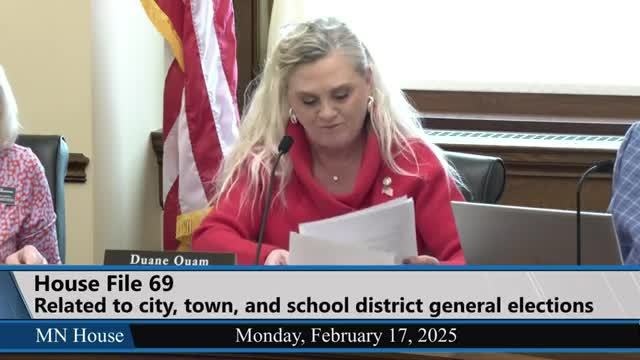Panel sends proposal to shift local school elections to even years to next committee amid ranked-choice and local-control concerns
Get AI-powered insights, summaries, and transcripts
Subscribe
Summary
The committee referred House File 69 to the Education Policy Committee after testimony from school boards and municipal groups arguing that forcing odd-year districts into even-year elections would erode local control and could disrupt ranked-choice voting plans in some cities.
The House Elections and Government Operations Committee referred House File 69 to the Education Policy Committee after hearing nearly an hour of testimony from local officials and school-district representatives opposed to a statewide mandate shifting remaining odd-year school board elections to even-numbered years.
Chair Quam said the measure is intended to increase voter participation by consolidating more elections into high-turnout November cycles. "If you have it so that more people vote, you get a truer voice of the people in elections," he said.
Testimony opposing the mandate came from Greg Abbott, representing the Minnesota School Boards Association and the Association of Metropolitan School Districts; Pierre Ouillet of the League of Minnesota Cities; and Jim Demay, a Mounds View school board member.
Greg Abbott told the committee that 25 of Minnesota's 331 school districts remain on odd-year schedules, and argued a state mandate would "force the remaining 25 districts into even-year elections, breaking the contract set when school district elections were moved from May to November." He said many districts retained odd-year elections to keep local, nonpartisan school contests focused on school issues.
Pierre Ouillet warned that a statewide mandate would erode local decision-making and could prevent cities from choosing alternative voting systems, including ranked-choice voting. "We feel strongly that we should preserve cities' local authority to do what they think is best for their communities," he said.
Several legislators raised ranked-choice voting and charter-city complications. Nonpartisan staff told members that first-class cities (Minneapolis and Saint Paul) would be exempt under the bill language, but that other municipalities that have adopted ranked-choice voting would need county-auditor agreements or other practical arrangements to conduct different ballot formats simultaneously.
Representative Freiberg urged more study and sought to preserve local options; Representative Coulter said his constituency includes charter cities with charter language specifying odd-year elections and said the bill's transition timelines could conflict with local charter processes.
Chair Quam renewed his motion to send the bill on for further consideration. "I would like to have this get discussed in the education policy committee," Quam said. The committee referred House File 69 to the Education Policy Committee for additional review and possible amendments.
